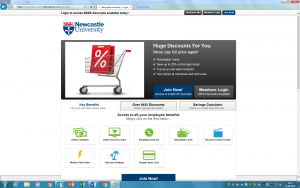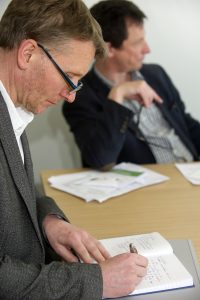In September I will be contributing to the Vice Chancellor’s think tank on equality and diversity and in particular, offering my views on what it is like to work here with a disability. I have ten minutes to make my case on a topic which I can chunter on about for hours. So I wonder what I should focus on?
I think there are two key points that the University needs to consider:
- We have to stop thinking about disability as binary, i.e. being disabled or not disabled. Isn’t it the case that many of us are somewh
 ere along a very long spectrum? A dodgy back, a grumbly knee, poor co-ordination, and so on. In our attempts to demonstrate compliance with the law, we in HR are guilty of labelling people as ‘disabled’ but I’m really not sure it is that helpful a box to put people in.
ere along a very long spectrum? A dodgy back, a grumbly knee, poor co-ordination, and so on. In our attempts to demonstrate compliance with the law, we in HR are guilty of labelling people as ‘disabled’ but I’m really not sure it is that helpful a box to put people in. - Nor is the degree of disability – our position on that spectrum – a constant. It varies massively depending sometimes on our impairment (many conditions fluctuate or are progressive in nature) and, more often, on our environment (where we are working, what equipment we have, how aware our colleagues are and so on). For me, all of these factors are at play and affect how ‘disabling’ my sight loss is.
 On a good day I am barely aware of having a disability – I have the right assistive technology to do my job, my colleagues remember to let me have those notes in advance so I can contribute effectively at our meeting, the bus driver is well trained in helping me get home, the pedestrian crossing works (find out about the secret button at pedestrian crossings) and I go to bed feeling accomplished, having contributed fully and not walked into any blunt objects.
On a good day I am barely aware of having a disability – I have the right assistive technology to do my job, my colleagues remember to let me have those notes in advance so I can contribute effectively at our meeting, the bus driver is well trained in helping me get home, the pedestrian crossing works (find out about the secret button at pedestrian crossings) and I go to bed feeling accomplished, having contributed fully and not walked into any blunt objects.
In contrast, a bad day is always around the corner and it’s not normally because my sight is any worse – more likely it’s an encounter with someone who simply doesn’t think or has not been trained, or when my computer decides to stop talking to me, or when a website is poorly designed, or a document I need isn’t available in a format I can use. Many of these disabling factors can be reduced or eliminated by our collective efforts as managers and colleagues.
Oh dear, I’m probably already running over my ten minute allocation. To cut to the chase then. What I hope we can do as a responsible employer is to look at disability as a fluid, movable state that we can influence in the way we treat people. Perhaps we can set ourselves the challenge of creating an environment that keeps people as close to the ‘not disabled’ end of the scale as we possibly can.
Guidance is available on ‘Enable’ the University support for disabled staff web pages.
Richard Boggie, Acting Assistant Director (HR Strategy)



